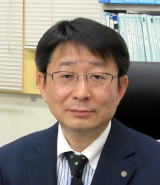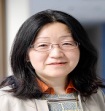

Messageメッセージ
The Renewal Opening of Hiroshima Peace Memorial Museum
We
congratulate the renewal opening of Hiroshima Peace Memorial Museum. After the
years of planning and extensive renovation the museum was reborn as a unique
site where visitors can reflect on the human cost of the world’s first
deployment of a nuclear weapon from multiple dimensions.
We
sincerely hope that the museum will give the worldwide visitors an opportunity to
consider and evaluate the facts by themselves and that they will find the
strength within themselves to act for universal peace.
To that
end, and on the basis of the comprehensive cooperation agreement between our parent
organizations, the Hiroshimna University and the Hiroshima Peace Culture
Foundation, the Center for Peace, Hiroshima University, renews our commitment
to continue collaborating with Hiroshima Peace Memorial Museum on research and
education to discover and disseminate evidence-based, reliable information on
the Atomic-bombings and nuclear issues.
Noriyuki Kawano
Professor / Director of the Center for Peace, University of
Hiroshima
2017 Nobel Peace Prize for ICAN and Speech by Hibakusha (survivors) at the Award Ceremony
On behalf of the Institute for Peace Science, Hiroshima University, I would like to express my sincerest congratulations to ICAN for receiving the Nobel Peace Prize.
I am also delighted to learn that three hibakusha will attend the Award Ceremony in Oslo to deliver an acceptance speech.
May the world share the awareness of the inhumanity of nuclear weapons.
30 October 2017
Statement
The Institute for Peace Science, HIROSHIMA UNIVERSITY welcomes the adoption of the Treaty on the Prohibition of Nuclear Weapons and pays deep respect to the Atomic Bomb survivors for their endlessly diligent efforts in achieving the adoption of the treaty.
This is a firm step forward towards realizing a Nuclear-Free World, which is the earnest desire of Hiroshima and Nagasaki.
Although many challenges remain to be tackled, the Institute for Peace Science, HIROSHIMA UNIVERSITY, will continue, through its academic contributions, to strive for the realization of a Nuclear-Free World.
9 July 2017
Noriyuki KAWANO,
Director, The Institute for Peace Science, HIROSHIMA UNIVERSITY.
Message from Director

“Aspiring to create the best and only research
institute of its kind”
Director of the Institute for Peace Science, Hiroshima University
(IPSHU)
Noriyuki Kawano, PhD
I am honored to have been appointed the
director of the Institute for Peace Science, Hiroshima University, on April 1,
2017.
As you know, our university was founded on
the basic principle of “the pursuit of peace” with the aspiration of realizing
worldwide peace. IPHSU, our research institute, plays a vital role in this
effort. It was established in 1975 and has since developed an enviable track
record through its endeavors. This is something on which we must continue to
build. While the philosophy of “Hiroshima” based on the concept of “a nuclear
free world” forms the unshakeable foundation of our work, we aspire to create a
more global and universal world of “Peace.” In particular, our current focus is
on upgrading, expanding, and deepening the framework of two of our core research
areas.
The first of these is Peace Studies,
founded on the philosophy of “Hiroshima.” This involves, for example, studies
on Atomic Bomb disasters and international relations with regard to nuclear
abolition and disarmament. These are research domains related to the concept of
“Hiroshima.” The other area of focus is Global Peace Studies. This covers a
range of topics, including, for example, the urgent issues of today: the plight
of refugees and problems of immigration. Also under the umbrella of Global
Peace Studies is “structural violence,” which takes into consideration a
variety of challenges (for example, poverty, local and global conflicts, etc.)
and environmental issues faced by developing countries. These are the areas of
study that we pursue: “Hiroshima Peace Studies” and “Global Peace Studies.”
Focusing on these two pillars, the IPSHU will continue to strive to attain the
number one position in Peace Studies research, delivering outcomes of a unique
“one and only” nature. We will not follow in the footsteps of other research
projects and earlier work. Rather, we will be pioneers in the aforementioned
specialized areas and lead the field. There may be many relevant studies, but
very few of them are trailblazing. I am convinced that by pursuing only the
very best research outcomes, we will be able to establish “Hiroshima Peace
Studies” as a new research field. I have faith that every staff member of our
institute will do their utmost to help achieve this dream.
The philosophy of “Hiroshima” is founded on the principles of a non-nuclear
world. They are shaped by the atrocious experiences of A-Bomb Survivors
and their unwavering conviction to fight the use of nuclear weapons, as
well as their constant efforts to realize a nuclear-free world. When A-Bomb
Survivors stand on a podium and pour their hearts out, relating their first-hand
experiences, they are received with applause. Why? Because these real-life
experiences of people strike a chord with the audience. These Hibakusha (A-Bomb Survivors) and their original experiences form
the backbone of the “Hiroshima” principles. However, we will not enjoy the
privilege of their presence for much longer. One day, in the near future, “Hiroshima”
is going to lose them. Before that day arrives, I would like to conduct an
in-depth academic review and discussion of the position of “Hiroshima” and its
roles. That, I consider, is an essential mission of the IPSHU, grounded on the
soil of Hiroshima, the city that survived the world’s first nuclear
attack.
I would, humbly, like to call on your continued support and cooperation
with our institute.
April 1st, 2017
Message from Vice Director
 “Greeting”
“Greeting”Vice Director of the Institute for Peace Science, Hiroshima University
(IPSHU)
Mari Katayanagi, PhD
I have been appointed to serve as the Vice Director of the Institute for Peace Science, Hiroshima University, as of 10 July this year. My research explores how peace can be built, based on my hands-on experience in United Nations peacekeeping, as well as peace-building efforts at another international organization.
Harnessing the opportunities given by working as an educator and researcher in peace-building studies in Hiroshima, I should like to analyze the reconstruction of Hiroshima, with a fresh perspective on the theories of peace-building. Concurrently, I aspire to contribute to the study of international conflicts and peace under the banner of Global Peace Studies, which Professor Kawano discussed in his message, while exchanging views and disseminating the research output through our institute’s presently expanding international research network.
I will make every effort to assist Professor Kawano, the Director of IPSHU, in his aim to establish Hiroshima Peace Studies.
The Center for Peace, Hiroshima University
平和センター
Higashisenda-machi 1-1-89, Naka-ku, Hiroshima 730-0053
Tel: 081-(0)82-542-6975
Fax: 081-(0)82-542-0585
E-mail: heiwa@hiroshima-u.ac.jp